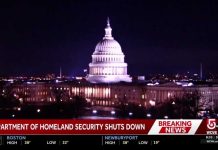
House Judiciary Committee Chairman Jim Jordan is leading a battle against rogue judges who undermine President Trump’s agenda through nationwide injunctions, declaring “everything is on the table” to rein in this judicial overreach.
Key Takeaways
- Jim Jordan is pushing for legislation to limit federal district judges’ ability to issue nationwide injunctions that block presidential actions, focusing on restricting rulings to only the parties and jurisdictions involved.
- The House Judiciary Committee has already passed the “No Rogue Rulings Act” and is planning additional hearings with experts to address judicial overreach targeting Trump administration policies.
- Jordan has formally requested that the House Appropriations Committee include language in funding bills prohibiting taxpayer dollars from being used to issue or enforce nationwide injunctions.
- Jordan noted that nationwide injunctions have been disproportionately used against President Trump compared to Biden, representing what he views as judicial activism rather than proper constitutional authority.
- While some Republicans have called for the impeachment of certain judges, Jordan is primarily focused on legislative remedies to preserve the balance of power between government branches.
Jordan’s Legislative Push Against Judicial Overreach
House Judiciary Committee Chairman Jim Jordan is spearheading efforts to curb what many conservatives see as dangerous judicial activism through nationwide injunctions that undermine Trump administration policies. In recent weeks, Jordan’s committee passed legislation designed to ensure that when a district judge issues an injunction, it would apply only to the parties involved in the specific case rather than having sweeping national effects. This move comes as part of a broader Republican strategy to address what they perceive as unelected judges improperly creating nationwide policy through individual court rulings.
“It’s why two weeks ago, the Judiciary Committee passed legislation which said when a federal district judge in Timbuktu, Calif., issues an injunction, it should only apply to the parties of the case in that respective jurisdiction, not apply nationwide. We passed it through the committee. We’ll try to look to pass it on the House floor and move it through the process,” said Jim Jordan, House Judiciary Committee Chairman.
The initiative reflects growing concern among Republicans about the judiciary’s role in blocking or delaying key Trump administration priorities. Jordan has been particularly vocal about recent actions, including a decision by District Court Judge James Boasberg that forced the administration to return deportees to the United States. The Ohio congressman, a staunch Trump ally, has made it clear that his committee is considering all available options to address what he views as judicial overreach, though his primary focus appears to be on legislative solutions rather than impeachment proceedings.
Using the Power of the Purse to Constrain Judicial Activism
Beyond direct legislation, Jordan is also seeking to use Congress’s appropriations authority to combat nationwide injunctions. In a formal letter to the House Appropriations Committee, he requested the inclusion of specific language in upcoming funding bills that would prohibit taxpayer dollars from being used to issue or enforce these sweeping injunctions. This approach represents a strategic effort to use Congress’s constitutional “power of the purse” to reinforce the proper limits of judicial authority without requiring Senate approval for new legislation.
“Since President Trump’s inauguration, we have seen a dangerous trend of district court judges issuing nationwide injunctions that disrupt the implementation of federal policies. These sweeping rulings, often handed down by a single judge, threaten the constitutional balance of power by overriding the popular will of the American people as embodied in Congress and the President,” said Jim Jordan, House Judiciary Committee Chairman.
Jordan’s letter specifically suggests limiting funds related to the issuance and enforcement of nationwide injunctions, including restricting court resources used to compel compliance, impose fines, or conduct contempt proceedings related to such injunctions. This approach demonstrates Jordan’s commitment to finding multiple avenues to address what he and many conservatives view as a critical constitutional issue affecting the Trump administration’s ability to implement its agenda effectively and fulfill campaign promises.
The Political Dimension: Trump’s Agenda vs. Judicial Interference
Jordan has been forthright about the political dimension of this issue, noting what he sees as a clear imbalance in how nationwide injunctions have been deployed against different administrations. According to the chairman, these sweeping judicial actions have been far more common under President Trump’s administration than under President Biden’s, suggesting a politically motivated pattern of judicial intervention. For Jordan and many Republicans, this disparity underscores their belief that some judges are actively working to obstruct Trump’s agenda rather than simply interpreting the law.
“I think it’s probably because President Trump is doing exactly what he told the voters he was going to do, and you got a judge who says, turn the plane around, bring the bad guys back to America. Maybe the dumbest thing I’ve ever heard,” Jim Jordan, House Judiciary Committee Chairman.
The judiciary’s role in immigration policy has been particularly contentious, with Jordan and other Republicans criticizing recent rulings that have impeded deportation efforts and border security measures. These cases highlight the broader ideological battle over executive authority, with conservatives arguing that immigration enforcement falls squarely within presidential powers while activist judges improperly interfere with legitimate policy decisions. Jordan’s push for reform represents not just a procedural concern but a fundamental disagreement about the constitutional separation of powers in America’s system of government.




